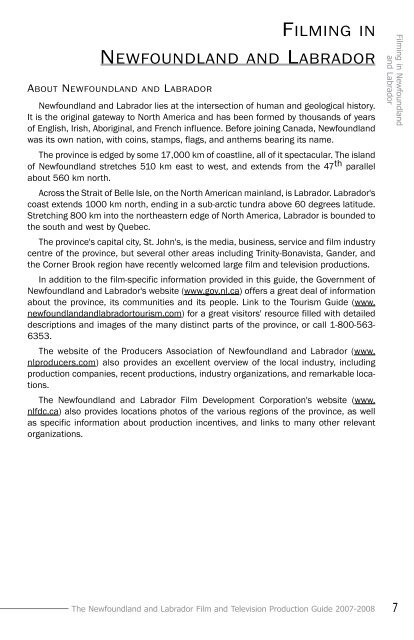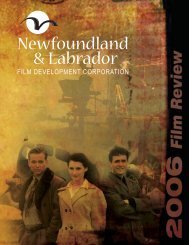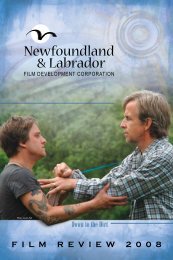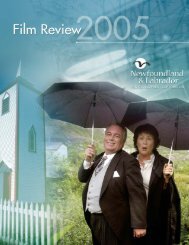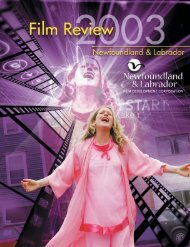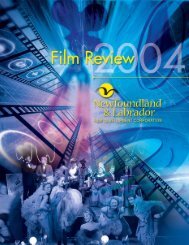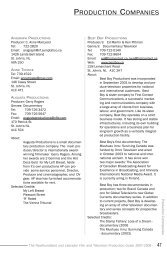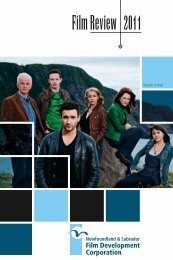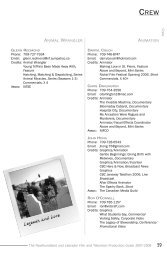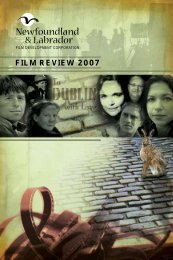FILMING IN NEWFOUNDLAND AND LABRADOR
FILMING IN NEWFOUNDLAND AND LABRADOR
FILMING IN NEWFOUNDLAND AND LABRADOR
Create successful ePaper yourself
Turn your PDF publications into a flip-book with our unique Google optimized e-Paper software.
Filming in<br />
Newfoundland and Labrador<br />
About Newfoundland and Labrador<br />
Newfoundland and Labrador lies at the intersection of human and geological history.<br />
It is the original gateway to North America and has been formed by thousands of years<br />
of English, Irish, Aboriginal, and French influence. Before joining Canada, Newfoundland<br />
was its own nation, with coins, stamps, flags, and anthems bearing its name.<br />
The province is edged by some 17,000 km of coastline, all of it spectacular. The island<br />
of Newfoundland stretches 510 km east to west, and extends from the 47 th parallel<br />
about 560 km north.<br />
Across the Strait of Belle Isle, on the North American mainland, is Labrador. Labrador's<br />
coast extends 1000 km north, ending in a sub-arctic tundra above 60 degrees latitude.<br />
Stretching 800 km into the northeastern edge of North America, Labrador is bounded to<br />
the south and west by Quebec.<br />
The province's capital city, St. John's, is the media, business, service and film industry<br />
centre of the province, but several other areas including Trinity-Bonavista, Gander, and<br />
the Corner Brook region have recently welcomed large film and television productions.<br />
In addition to the film-specific information provided in this guide, the Government of<br />
Newfoundland and Labrador's website (www.gov.nl.ca) offers a great deal of information<br />
about the province, its communities and its people. Link to the Tourism Guide (www.<br />
newfoundlandandlabradortourism.com) for a great visitors' resource filled with detailed<br />
descriptions and images of the many distinct parts of the province, or call 1-800-563-<br />
6353.<br />
The website of the Producers Association of Newfoundland and Labrador (www.<br />
nlproducers.com) also provides an excellent overview of the local industry, including<br />
production companies, recent productions, industry organizations, and remarkable locations.<br />
The Newfoundland and Labrador Film Development Corporation's website (www.<br />
nlfdc.ca) also provides locations photos of the various regions of the province, as well<br />
as specific information about production incentives, and links to many other relevant<br />
organizations.<br />
Filming in Newfoundland<br />
and Labrador<br />
The Newfoundland and Labrador Film and Television Production Guide 2007-2008
Climate and Daylight<br />
Newfoundland and Labrador contain a fascinating array of climates and weather. The<br />
province extends from 47 to 60 degrees north latitude, and most of the province experiences<br />
short, cool summers and long winters, though often without the extreme cold of<br />
mainland Canada. Northern Labrador has a sub-polar climate with long summer days<br />
and long winter nights.<br />
The province's weather is moderated by the ocean's proximity. In Labrador, coastal<br />
areas can be colder and stormier than the interior due to the Labrador Current. Coastal<br />
areas on the island, on the other hand, tend to experience more of a temperate marine<br />
climate, with slightly cooler summers and fairly mild winters, but more wind than would<br />
be encountered inland.<br />
Daily Mean Temperatures by Region:<br />
Precipitation averages about 1,120 mm yearly in Newfoundland, with about 300 mm<br />
of that falling as snow. Labrador averages precipitation of about 760 mm, half of it<br />
snow, with precipitation lessening as you travel further north.<br />
Forecasts, marine forecasts, sunrise and sunset, and local weather conditions are<br />
available through Environment Canada's web site at:<br />
http://weatheroffice.ec.gc.ca<br />
or call 709-772-5534<br />
Weather One-on-One telehoen consultation with an Environment Cnaada meteorologist<br />
is available for $2.99 per minute at: 1-900-565-5555.<br />
Transportation<br />
By Air:<br />
There are two international airports on the island, at Gander and St. John's. In addition,<br />
there are airports at Stephenville and Deer Lake on the west coast, and at St.<br />
Anthony on the northern peninsula.<br />
In Labrador, there are airports at Happy Valley-Goose Bay, at Churchill Falls and<br />
Wabush. Local airstrips along coastal Labrador accommodate small aircraft.<br />
<br />
FILM Producers Association of<br />
Newfoundland
Flying from: Goose Bay Halifax Toronto New York London<br />
To St. John's 2.0 hour 1.5 hours 3 hours 5 hours 5.5 hours<br />
Air Canada, Tango, and Jazz operate regular flights from all major centres in North<br />
America and Europe. WestJet also has many flights from St. John's to other Canadian<br />
cities. Continental Airlines flies regularly between St. John's and Newark, NJ. Within the<br />
province, Air Canada Jazz, Provincial Airlines, and Air Labrador provide regular service.<br />
Air Labrador provides services to coastal Labrador, and Provincial Airlines serves the<br />
French island of St. Pierre, off Newfoundland's south coast.<br />
Air Canada and Jazz<br />
Air Canada Tango<br />
Provincial Airlines<br />
Air Labrador<br />
WestJet<br />
Continental<br />
www.aircanada.ca<br />
www.flytango.ca<br />
www.provair.com<br />
www.airlabrador.com<br />
www.westjet.com<br />
www.continental.com<br />
Filming in Newfoundland<br />
and Labrador<br />
St. John's airport (flight information)<br />
www.stjohnsairport.com<br />
Ferry Services and Coastal Boats:<br />
Marine Atlantic runs daily crossings between North Sydney, NS, and Port aux Basques,<br />
NL. The crossing takes 5 to 7 hours. From mid-June to mid-September, there are also<br />
regular crossings between North Sydney and Argentia, an hour and a half drive from St.<br />
John's on the Avalon Peninsula. The crossing takes 14 hours. Sleeping acommodations<br />
can be arranged on both crossing.<br />
Reservations for Marine Atlantic ferries are required. Schedules and reservations can<br />
be obtained through:<br />
Marine Atlantic Reservations Bureau<br />
Toll free: 1-800 341-7981<br />
Telephone: 902-564-7480<br />
Web: www.marine-atlantic.ca<br />
The Province of Newfoundland and Labrador maintains a comprehensive ferry service<br />
connecting with coastal islands and remote communities. Detailed information on destinations<br />
and schedules can be found through:<br />
Department of Transportation and Works<br />
Telephone: 709-729-3281<br />
Web: www.gov.nl.ca./FerryServices<br />
Coastal Labrador is serviced by a system of coastal boats traveling as far north as<br />
Nain. They run on regular schedules, spring through fall. A ferry service runs between<br />
Blanc Sablon, on the Labrador Straits, and St. Barbe on the Northern Peninsula of the<br />
island. For information and reservations:<br />
Telephone: 1-866-535-2567<br />
The Newfoundland and Labrador Film and Television Production Guide 2007-2008
Roads and Highways:<br />
On the island, the Trans-Canada Highway, Route 1, runs 905 km from Port aux<br />
Basques to St. John's. Generally, the speed limit is 100 km/hr.<br />
Driving from: Port aux Basques Deer Lake St. Anthony Gander<br />
To St. John's 10.5 hours 7 hours 12 hours 3.5 hours<br />
Major towns and smaller communities on the island are connected to the TCH by<br />
paved secondary roads, generally with speed limits of 80 km/hr. Usually hugging the<br />
shoreline, the picturesque, winding roads connect communities along the coast.<br />
Vehicle rentals are available on the island through major companies. Advance reservations<br />
are advised during tourism season.<br />
In Labrador, roadways are more sparse and travel in winter is accomplished by air,<br />
boat, and skidoo. A 525 km gravel highway, Route 500, connects Happy Valley-Goose<br />
Bay to Labrador City-Wabush, approximately a nine-hour drive. On the southernmost<br />
shoreline, Route 510 links Blanc Sablon to Red Bay and connects to the coastal boat<br />
system and the ferry to Newfoundland.<br />
Rail and Bus:<br />
On the island, a narrow-gauge rail system was dismantled in favour of a trans-island<br />
highway and bus system. Several old rail stations, notably at St. John's and Brigus<br />
Junction, have been preserved as heritage sites.<br />
DRL Coachlines runs a bus service across the island. Information on destinations and<br />
schedules can be requested at:<br />
DRL Coachlines, St. John's<br />
Toll free: 1-888-263-1854<br />
Telephone: 709-263-2171<br />
Email: drlgroup@nf.aibn.com<br />
Web: www.drlgroup.com<br />
Many smaller communities on the island are served by privately operated regional taxi<br />
services, linking them to bus routes or major centers. Regional taxi services are generally<br />
listed in local phone directories.<br />
Rail service is available to Western Labrador from Sept-Îles, Quebec. Contact Quebec<br />
North Shore and Labrador Railway at:<br />
Telephone: 1-418-968-7400 in Quebec, and<br />
Telephone: 709-944-8400 or 709-944-2490 in Labrador<br />
Traffic Regulations:<br />
Drivers must carry a valid Driver's Licence, Vehicle Registration Certificate and Proof<br />
of Liability Insurance Coverage. Legislation requires that motorists carry lump-sum public<br />
liability and property damage insurance of $200,000. In case of an accident involving<br />
personal injury, proof of such insurance must be produced within 24 hours or driving<br />
privileges could be suspended. The driver and all passengers must wear seat belts.<br />
A child weighing less than nine kilograms must be secured in either an infant carrier<br />
or a convertible car seat adjusted to the rear-facing position. The driver is responsible<br />
for ensuring all passengers under the age of 16 are properly restrained by seat belts.<br />
Radar detectors are illegal. It is illegal to drive with a blood alcohol limit exceeding .05<br />
per cent.<br />
10<br />
FILM Producers Association of<br />
Newfoundland
Watch Out for Moose:<br />
There are about 110,000 moose on the island of Newfoundland, and most highways<br />
go through good moose habitat. Moose are great to look at from a distance. If you see<br />
one on or near a highway, use extreme caution, slow down and prepare to stop. Like all<br />
wild animals, moose are unpredictable. Be sure the moose has either crossed the highway<br />
or gone back into the forest before resuming your drive. Also, if you see a vehicle<br />
stopped on or near the highway, the driver may have spotted a moose, so be cautious.<br />
Avoid driving at night if possible as most moose vehicle accidents occur between dusk<br />
and dawn. If you must drive at night, slow down. Scan both sides of the highway with<br />
your lights on high beam unless overtaking other traffic, and pay attention to warning<br />
signs. A road sign like "Caution, moose next 11 kilometres" means moose cross there<br />
frequently.<br />
Filming in Newfoundland<br />
and Labrador<br />
Winter Travel:<br />
During the winter, all primary highways are kept open except for short periods during<br />
or immediately after a severe snowstorm. For information on road conditions, contact<br />
these Department of Works, Services and Transportation regional offices:<br />
Avalon Region 709-729-7669<br />
Eastern Region 709-466-4160<br />
Central Region 709-292-4444<br />
Western Region 709-635-4144<br />
Labrador Region 709-896-7888<br />
Highway driving conditions, including construction, slow downs and updated images<br />
from live highway cameras throughout the province, are available at:<br />
www.roads.gov-nl.ca<br />
Time Zones:<br />
The island of Newfoundland occupies its own time zone, known as Newfoundland<br />
Time. It is half an hour later than Atlantic Time and an hour and a half later than Eastern<br />
Time. Most of Labrador is in the Atlantic Time Zone.<br />
Passports:<br />
American citizens or permanent residents of the United States do not need a passport<br />
to visit Canada, but should carry a birth, baptismal or voter's certificate, or other documents<br />
establishing their citizenship. Naturalized U.S. citizens should carry evidence of<br />
citizenship, such as a naturalization certificate. Visitors from all other countries must<br />
have valid national passports.<br />
Currency:<br />
The Canadian dollar is the currency used in Newfoundland and Labrador. Many operators<br />
and retailers will accept American dollars, but not always at the official exchange<br />
rate. Businesses do not accept other foreign currencies; and there is no currency<br />
exchange house in the province. Even banks do not normally exchange foreign currencies.<br />
We recommend that you convert your national currency into Canadian dollars<br />
before you leave home.<br />
The Newfoundland and Labrador Film and Television Production Guide 2007-2008 11
Pets and Animals:<br />
You can bring a cat, dog or horse to Newfoundland and Labrador without a permit, and<br />
they can be moved freely between Newfoundland and Labrador. However, the importation<br />
of non-indigenous animals and the movement of Labrador Huskies from Labrador<br />
to Newfoundland is restricted. If you have any questions about bringing animals to the<br />
province, please contact:<br />
Animal Health Division<br />
Department of Forest Resources and Agrifoods<br />
P.O. Box 7400<br />
St. John's, NL A1E 3Y5<br />
Telephone: 709-729-6879/6886<br />
Web: www.nr.gov.nl.ca/agric/<br />
Note: There are no skunks or snakes on the island of Newfoundland, and there is no<br />
poison ivy or poison oak.<br />
Soil and Plants:<br />
Neither soil nor plants bearing soil may be removed from Newfoundland because of<br />
the possibility of accidentally spreading soil-borne diseases from certain areas. Vehicles<br />
leaving Newfoundland are inspected at the ferry terminals, and soil and plants are subject<br />
to confiscation. Special permits for removing plants under strict conditions may be<br />
obtained from Canadian Food Inspection Agency. Please telephone 709-227-2307 or<br />
709-695-2135 for further information.<br />
Deposits, Credit Cards and Refunds:<br />
When you make a reservation, it's always a good idea to ask the operator about the<br />
cancellation of deposits, what credit cards are accepted, and the establishment's policies<br />
on refunds and late arrivals. Some seasonal operators may have a minimum stay<br />
policy in effect. Some operators do not accept credit cards. If you are asked to pay in<br />
advance, it's always a good idea to ask to see the room first.<br />
Firearms:<br />
Firearms are strictly controlled in Canada, and fully automatic weapons are banned.<br />
Visitors may bring firearms into the country only for a legitimate purpose, such as hunting<br />
or a target shooting competition. For further information, please contact the Canadian<br />
Firearms Centre at 1-800-731-4000 in Canada and the US, or 506-624-5380 from other<br />
countries.<br />
Visiting St Pierre and Miquelon:<br />
St Pierre and Miquelon is a part of France, only 12 miles from Fortune, Newfounndland.<br />
For information on travel and customs regulations call their tourism office at 1-800-563-<br />
2006 or visit their website at www.st-pierre-et-miquelon.com.<br />
Online Information:<br />
The Government of Canada maintains a website with links to government sevices,<br />
information and resources for people planning a visit to our country, including downloadable<br />
forms, frequently asked questions and a currency converter to help you plan your<br />
12<br />
FILM Producers Association of<br />
Newfoundland
Directory of Important Telephone Numbers:<br />
trip. Go to www.canadainternational.gc.ca<br />
and click on Going to Canada.<br />
Emergencies 911<br />
Operator 24 hours 0<br />
Air Distress 1-800-565-1582<br />
Marine Rescue Centre 1-800-563-2444<br />
(24 Hours) 772-5151<br />
Dial Before You Dig 611<br />
Crime Stoppers 1-800-363-8477<br />
Environmental Emergencies (24 Hours)<br />
St. John's 772-2083<br />
Other Areas 1-800-563-9089<br />
Industrial Accidents 729-4444<br />
(24 Hours)<br />
Poison Information Centre (24 Hours)<br />
St. John's 722-1110<br />
Toll Free 1-866-727-1110<br />
Hospitals<br />
St. John's - Eastern Region<br />
General 777-6300<br />
Janeway 777-6300<br />
St. Clare's 777-5000<br />
Bell Island 448-2821<br />
Bonavista 468-7881<br />
Burin 891-1040<br />
Carbonear 945-5111<br />
Clarenville 466-3411<br />
Grand Bank 832-2500<br />
Old Perlican 587-2200<br />
Placentia 227-2013<br />
St. Lawrence 873-2220<br />
Whitbourne 759-2300<br />
Hospitals<br />
Labrador Region<br />
Goose Bay 896-2417<br />
Labrador City 944-2632<br />
St. Anthony 454-3333<br />
Hospitals<br />
Central Region<br />
Gander 256-2500<br />
Grand Falls-Windsor 292-2500<br />
Baie Verte 532-4281<br />
Buchans 672-3326<br />
Fogo Island 266-2221<br />
Harbour Breton 885-2359<br />
Twillingate 884-2131<br />
Hospitals<br />
Western Region<br />
Bonne Bay 458-2211<br />
Burgeo 886-3350<br />
Corner Brook 637-5000<br />
Port Saunders 861-3533<br />
Stephenville 643-5111<br />
Community Services<br />
Community Services<br />
Council 753-9860<br />
Addiction Services<br />
St. John's 752-4919<br />
Clarenville 466-5700<br />
Corner Brook 634-4506<br />
Children's Protective<br />
Services (24 Hour) 752-4619<br />
Kids Help Phone 1-800-668-6868<br />
(24 Hour)<br />
Mental Health Services<br />
Crisis Line 737-4668<br />
Toll Free 1-888-737-4668<br />
Filming in Newfoundland<br />
and Labrador<br />
The Newfoundland and Labrador Film and Television Production Guide 2007-2008 13
Film Permits, Regulations, Taxation and Import<br />
1. Permits to Film<br />
Local:<br />
Producers are advised to contact local authorities well in advance of their planned<br />
shoot to ensure awareness of and compliance with local regulations. For example, the<br />
City of St. John's has developed specific regulations for filming that are administered by<br />
its Special Events Committee - depending on the size and location of a shoot, permits<br />
and public notices may be required.<br />
City Of St. John's<br />
www.stjohns.ca/index.jsp<br />
Film Gander<br />
www.filmgander.com/main.htm<br />
City Of Corner Brook<br />
www.cornerbrook.com<br />
Local government contact information can be found through the provincial government<br />
or the Federation of Municipalities. Local officials can be helpful in identifying<br />
authorities responsible for local infrastructure, such as historic sites or public wharves.<br />
Department of Municipal & Provincial Affairs, Local Government Division<br />
Tel: 709-729-5341 Contact: John Moore, Director<br />
Newfoundland and Labrador Federation of Municipalities<br />
www.nlfm.nf.ca<br />
Parks and Historic Sites, Government Lands:<br />
The province manages provincial parks, wilderness areas, some historic sites and<br />
the provincial museum and archives. For permission to film in these locations, contact<br />
should be made with an appropriate division of the Department of Tourism, Culture and<br />
Recreation.<br />
Department of Tourism, Culture & Recreation<br />
Tel: 709-729-0592 Contact: Linda Badcock, Historic Sites Officer<br />
Tel: 709-757-8020 The Rooms, Provincial Museum Division<br />
Tel: 709-729-2222 Parks and Natural Areas Division<br />
Hundreds of communities across the province support local museums or historic<br />
sites. Contact information can be found through the Museums Association.<br />
Museum Association of Newfoundland and Labrador, St. John's<br />
Tel: 709-722-9034 Contact: Ute Oshevsky<br />
www.manl.nf.ca<br />
For filming on provincially-owned lands, roads, wharves or other infrastructure, contact:<br />
Department of Government Services<br />
Tel: 709-729-3699<br />
www.gs.gov.nl.ca or link to on-line inquiries at www.gs.gov.nl.ca/locations.stm<br />
14<br />
14 FILM Producers Association of<br />
Newfoundland
The Department of Canadian Heritage oversees historic and natural resources through<br />
Parks Canada. For filming at national parks or historical sites throughout Newfoundland<br />
and Labrador, permission should be sought from:<br />
Department of Canadian Heritage (Parks Canada)<br />
709-722-5364 Edna Hall, Director<br />
www.pch.gc.ca<br />
Other relevant websites:<br />
Gros Morne National Park<br />
www.pc.gc.ca/pn-np/nl/grosmorne<br />
Terra Nova National Park<br />
www.pc.gc.ca/pn-np/nl/terranova<br />
Cape Spear National Historic Site of Canada<br />
www.pc.gc.ca/lhn-nhs/nl/spear<br />
Castle Hill National Historic Site of Canada<br />
www.pc.gc.ca/lhn-nhs/nl/castlehill<br />
Hawthorne Cottage National Historic Site of Canada<br />
www.pc.gc.ca/lhn-nhs/nl/hawthorne<br />
Hopedale Mission National Historic Site of Canada<br />
http://www.pc.gc.ca/voyage-travel/pv-vp/itm1-/page16_e.asp<br />
L'Anse aux Meadows National Historic Site of Canada<br />
www.pc.gc.ca/lhn-nhs/nl/meadows<br />
Port au Choix National Historic Site of Canada<br />
www.pc.gc.ca/lhn-nhs/nl/portauchoix<br />
Red Bay National Historic Site of Canada<br />
www.pc.gc.ca/lhn-nhs/nl/redbay<br />
Ryan Premises National Historic Site of Canada<br />
www.pc.gc.ca/lhn-nhs/nl/ryan<br />
Signal Hill National Historic Site of Canada<br />
www.pc.gc.ca/lhn-nhs/nl/signalhill<br />
Filming in Newfoundland<br />
and Labrador<br />
On Air and Water:<br />
Plans to film on oceans and inland waters should be reviewed with the relevant<br />
government agencies to ensure compliance with safety regulations and to ensure fish<br />
habitat is not adversely affected.<br />
Canadian Coast Guard, St. John's<br />
General Inquiries 709-772-5159<br />
Marine Communications and Traffic Services 709-772-2083<br />
Marine Rescue 709-772-5151<br />
Toll Free 1-800-563-2444<br />
Environmental Emergencies 709-772-2083<br />
Toll Free 1-800-563-9089<br />
The Newfoundland and Labrador Film and Television Production Guide 2007-2008 15
Fisheries and Oceans Canada - Newfoundland<br />
www.dfo-mpo.gc.ca<br />
General inquiries: 709-772-4423<br />
Tidal information: 1-800-775-0790<br />
Canadian Hydrographic Service<br />
www.charts.gc.ca<br />
Transport Canada regulates flight safety, and would stipulate conditions for permitting<br />
low-level flying and other flight activity outside standard regulations. Contact:<br />
Transport Canada, General Aviation, Moncton<br />
Tel: 1-506-851-7484 Contact: Bob Lavers<br />
email: laversb@tc.gc.ca<br />
Specific permits, licences and regulations may apply to particular conditions where<br />
health and safety are at risk, and are outlined in detail in the provincial film industry<br />
Health and Safety Guidelines available on the NLFDC website at www.nlfdc.ca<br />
2. Labour, Health and Safety<br />
The Newfoundland and Labrador film industry has worked with the provincial government<br />
to develop Health and Safety Guidelines for the Film Industry. The guidelines<br />
include detailed information on rules, procedures and regulations pertinent to the film<br />
industry, from electrical hook-ups, to permits for pyrotechniques, to animal handling. All<br />
film productions are required to assign an on-site health and safety officer to ensure<br />
compliance with the guidelines and health and safety regulations.<br />
The Health and Saftely Guidelines for the Film Industry is available on request from<br />
the NLFDC, and are posted on the NLFDC web site at:<br />
www.nlfdc.ca/pdf/Health_Safety_Guidelines.pdf<br />
The province has established labour standards, and regulates workplace health and<br />
safety. Information about this can be found at www.hrle.gov.nl.ca/lra or contact:<br />
Labour Standards Division<br />
Telephone: 709-729-2743 / 729-2742<br />
Toll free: 1-877-563 -1063<br />
email: LabourStandards@gov.nl.ca<br />
The provincial Workers' Compensation Act requires film production companies to<br />
register with the Workplace Health Safety and Compensation Commission (WHSCC) and<br />
pay assessments based on their payroll. This will include regular full-time employment<br />
as well as part-time and casual contract employment. The primary responsibility to<br />
register with WHSCC lies with the employer. In addition, the Workplace Health Safety<br />
and Compensation Commission requires that employers ensure that a number of their<br />
employees in any workplace are qualified in first aid. A registration kit is available by<br />
request from Workplace Health Safety and Compensation Commission offices:<br />
St. John's Telephone: 709-778-1000 Toll Free: 1-800-563-9000<br />
Grand Falls Telephone: 709-489-1600 Toll Free: 1-800-563-3448<br />
Corner Brook Telephone: 709-637-2700 Toll Free: 1-800-563-2772<br />
or find the appropriate forms on-line at: www.whscc.nf.ca<br />
16<br />
FILM Producers Association of<br />
Newfoundland
3. Work by Non-Canadians, Taxes and Imports<br />
Immigration<br />
Non-Canadian citizens are required to obtain a permit to work in Canada. This is<br />
arranged by contacting a Canadian Embassy or Consular Office in the country of the<br />
applicant's origin, and providing information on the purpose and duration of the proposed<br />
activities in Canada. The Embassy or Consular Office liaises with potential employers<br />
and partners in Canada to expedite approval and issue of work permits.<br />
Film producers who act on their own behalf or represent a company, as well as company<br />
controllers, may be exempt from requiring a work permit. During scouting, personnel<br />
may be allowed to enter temporarily without employment authorization. Producers,<br />
production executives and auditors should have a letter from the company they work<br />
for outlining their position with the company, their responsibilities, and the purpose and<br />
nature of their trip to Canada. They should have this letter and their passport with them<br />
when they arrive in Canada, and report to an Immigration Officer to clarify their status.<br />
For more information, please visit the Federal Government's Canada International<br />
website at canadainternational.gc.ca. This website contains a great deal of useful<br />
information about Canada and doing business in Canada. In Canada and the USA, the<br />
toll free phone number for Canada International is 1-800-755-7046. The website also<br />
lists the appropriate toll free numbers if calling from other parts of the world. Email:<br />
CanadaInternational@Canada.gc.ca. You may also contact: Citizenship and Immigration<br />
Canada - Tel: 1-888- 242-2100.<br />
The Foreign Worker Program of Human Resources and Social Development Canada<br />
(HRSDC) is directed to Canadian employers who want to hire foreign workers. The film<br />
and entertainment sector has specific processes for employers planning to hire foreign<br />
workers in Canada. In Newfoundland and Labrador please contact:<br />
Human Resources and Social Development Canada<br />
223 Churchill Avenue<br />
P.O. Box 8548<br />
St. John's, Newfoundland & Labrador A1C 3P3<br />
Telephone: (709) 772-2982<br />
Fax: (709) 772-0354<br />
Filming in Newfoundland<br />
and Labrador<br />
Federal Business Registration and Taxation<br />
Film producers working in Canada are required to register their business activity with<br />
the Canada Revenue Agency (CRA) through the nearest office. The revenue department<br />
will provide the company with a BN (Business Number), which is to be used in remitting<br />
deductions from payroll, filing for goods and service tax and corporate income tax, and<br />
to identify importer accounts.<br />
The Government of Canada website canadabusiness.gc.ca links to specific information<br />
concerning regulations and requirements for doing business in Canada. Or you can<br />
directly contact the Canada Revenue Agency. Guides and forms are available online at<br />
www.cra-arc.gc.ca. Business enquiries toll free: 1 800 959-5525. Forms and publications<br />
toll free: 1-800-959-2221.<br />
The Newfoundland and Labrador Film and Television Production Guide 2007-2008 17
At canadabusiness.gc.ca you can also link to the website of the Canada/Newfoundland<br />
and Labrador Business Service Network. Or you can visit their website directly at www.<br />
cbsc.org.<br />
The Canada/Newfoundland and Labrador Business Service Network website provides<br />
a wide variety of information about doing business in this province with links to the<br />
appropriate Federal and Provincial Government agencies. The Canada/Newfoundland<br />
and Labrador Business Service Network has over 35 locations in the province. 1-800-<br />
668-1010 or 709-772-6022. Fax 709-772-6090. Email: info@cbsc.ic.gc.ca.<br />
Non-residents of Canada may be subject to Canadian taxes based on their earnings<br />
while in Canada. Independent contractors who are not in an employee relationship may<br />
obtain a tax waiver, on application, from the Canada Revenue Agency exempting their<br />
earnings from withholdings. Each non-resident should apply to Canada Revenue Agency<br />
for clarification of their situation, as there are many variables such as length of stay and<br />
position. Tax counsel should be obtained regarding contracts that have services provided<br />
in two countries.<br />
Sales Taxes and Sales Tax Rebates<br />
A 14% federal-provincial Harmonized Sales Tax is applied to most goods and services<br />
in Newfoundland and Labrador. However, non-Canadian visitors and non-Canadian businesses<br />
can apply for a refund of sales taxes paid on certain items.<br />
Information about this is provided on the Canada International website (canadainternational.gc.ca).<br />
Connect to the Publications section of the website for brochures about<br />
visitor tax rebates. Or you can call, within Canada, toll free 1-800-668-4748. Outside<br />
Canada, call 902-432-5608.<br />
A production company that makes sales (or rentals or exchanges) while carrying on<br />
business in Canada may be required to become a GST registrant. A company that carries<br />
on business in Canada but makes no sales may still be entitled to register. Information,<br />
forms and registration materials are available through: Canada Revenue Agency, Excise<br />
GST/HST - www.cra-arc.gc.ca - 1-800-959-5525.<br />
Canada Customs Regulations/Ports of Entry<br />
Equipment and goods being temporarily brought into Canada to be used in film production<br />
may qualify for duty-free entry. If goods do qualify for duty-free entry, they may<br />
also qualify for remission of all or part of taxes paid or of customs duties paid. Goods<br />
may be further subject to GST, or may be partially or fully relieved of GST. The services<br />
of a customs broker is recommended. Information on import and export can be found<br />
through the Canada Revenue Agency (www.cra-arc.gc.ca) and the Canada Border<br />
Services Agency, District Office, St. John's 709-772-4335 (www.cbsa.gc.ca).<br />
18<br />
FILM Producers Association of<br />
Newfoundland
Filming in Newfoundland<br />
and Labrador<br />
The Newfoundland and Labrador Film and Television Production Guide 2007-2008 19
20<br />
FILM Producers Association of<br />
Newfoundland
Young Triffie's Been Made Away With<br />
2006 - Feature Film<br />
Morag Loves Company (NL) & Cineimaginaire (Quebec)<br />
Produced by:<br />
Co-produced by:<br />
Directed by:<br />
Written by:<br />
Synopsis:<br />
Denise Robert & Daniel Louis<br />
Barbara Doran, Lynne Wilson & Mary Walsh<br />
Mary Walsh<br />
Mary Walsh, Ray Guy & Christian Murray<br />
A black comedy based on the play by Ray Guy. Set<br />
in pre-confederation Newfoundland, rookie Ranger<br />
Alan Hepditch is sent to Swyer's Harbour to investigate<br />
the mutilation of sheep only to find himself<br />
leading a murder investigation when the body of<br />
15-year-old Triffie Pottle washes up on the shore.
Newfoundland and Labrador Film Development<br />
Corporation<br />
The Newfoundland and Labrador Film Development Corporation was formed in late<br />
1997 by the Government of Newfoundland and Labrador. A crown corporation, the NLFDC's<br />
mandate is to promote the development of the indigenous film and video industry and to<br />
promote our film and television products and locations nationally and internationally.<br />
The NLFDC administers two main programs on behalf of the Province: the Equity<br />
Investment Program (EIP), including development funds, and the Newfoundland and<br />
Labrador Film and Video Tax Credit Program.<br />
The EIP is a financial contribution, to a maximum of 20% of the total production budget<br />
(normally not to exceed $250,000) that shall be repaid from earned income revenue<br />
resulting from production.<br />
The tax credit is a fully refundable corporate income tax credit administered on behalf<br />
of the Department of Finance by the NLFDC. The tax credit encourages the development,<br />
training and hiring of Newfoundland and Labrador film personnel. The credit is based on<br />
a calculation of eligible labour limited to the less of 25% of the total eligible budget or<br />
40% of the total eligible labour expenditures. A deeming provision allows non-residents<br />
to be considered for the tax credit under certain circumstances, when no qualified resident<br />
is available, and the deemed non-resident mentors a resident crew member. The<br />
deeming provision requires a formal application by the production to the NLFDC.<br />
The NLFDC's Marketing and Human Resource Development Program assists qualified<br />
individuals and organizations with small sponsorships which enable them to promote<br />
the products of the local industry. As well, the NLFDC has a fulltime Professional<br />
Development Administrator who works on behalf of crew, producers, filmmakers, and the<br />
industry as a whole to organize and support specific workshops, training opportunities,<br />
job placements, and other projects designed to increase the local industry's capacity.<br />
On a daily basis, the NLFDC facilitates and fosters the local industry. It fields many<br />
requests and enquires concerning Newfoundland and Labrador as a shooting location.<br />
The NLFDC also advises and counsels local filmmakers, production companies and crew.<br />
It provides information concerning all aspects of the film industry, including: its own programs,<br />
and those of other local organizations, as well as information regarding national<br />
funders, broadcasters, and distributors.<br />
The NLFDC partners with local, regional and national organizations and sits on various<br />
national committees, including the Association of Provincial Funding Agencies and<br />
the National Tax Credit Committee. In this way it helps to shape and influence policy for<br />
the benefit of this Newfoundland and Labrador.<br />
Contact:<br />
The Newfoundland and Labrador Film Development Corporation<br />
12 King's Bridge Road,<br />
St. John's, NL A1C 3K3<br />
709 738-3456 1-877-738-3456 (toll free)<br />
709 739- 1680 (fax)<br />
www.nlfdc.ca<br />
Newfoundland and Labrador Film<br />
Development Corporation<br />
The Newfoundland and Labrador Film and Television Production Guide 2007-2008 23
24<br />
FILM Producers Association of<br />
Newfoundland
Hatching, Matching & Dispatching<br />
2006 - Comedy Television Series (6 x 30 mins)<br />
2M Innovative<br />
Produced by:<br />
Directed by:<br />
Written by:<br />
Synopsis:<br />
Mary Sexton<br />
Henry Sawer-Foner & Stephen Reynolds<br />
Mary Walsh & Ed Macdonald<br />
Often in outport Newfoundland it is left to one<br />
enterprising family to literally taxi the residents<br />
from the cradle to the grave, offering wedding,<br />
funeral and ambulance services all under the<br />
same roof. Hatching, Matching & Dispatching follows<br />
the adventures of the Furey family as they<br />
provide that service, ferrying the residents of Cats<br />
Gut Cove right from the sperm to the worm, with<br />
side-splittingly funny results.
The Film Sector in<br />
Newfoundland and Labrador<br />
While evidence exists of Newfoundlanders shooting film and newsreel footage as far<br />
back as 1904, and the island was occasionally a shooting location over the years, the<br />
indigenous film industry did not gain a foothold in Newfoundland until the 1970's. At that<br />
time a cultural revival (as a response to the previous 20 years of cultural amalgamation<br />
with Canada) swept through the artistic landscape, inspiring artists to search for a new,<br />
and distinctly "Newfoundland" perspective.<br />
When young filmmakers, actors, writers, and photographers began making local<br />
films in the early 1970s, there was little experience and even less money, so they gathered<br />
whatever equipment they could find and taught themselves how to make movies.<br />
This "do-it-yourself" ethic prompted the formation of the Newfoundland Independent<br />
Filmmakers Cooperative (NIFCO) in 1975, to ensure that the means of film production<br />
were available to artists working in the province. Since then NIFCO has grown into a complete<br />
production and post-production facility for established filmmakers, and continues<br />
to act as an incubator for new talent.<br />
Stemming from the formation of NIFCO, the production of short-films and documentaries<br />
flourished, with Newfoundland's first feature-length film (The Adventures Of Faustus<br />
Bidgood) being released in 1986. Paralleling this trend, television production began to<br />
take off in the 1980's, initially with audience-supported local fare on CBC (Wonderful<br />
Grand Band, Up At Ours, etc). Throughout the 80's and 90's documentaries, shorts, feature<br />
films and television work all expanded rapidly, and with increasing production values<br />
and improved industry professionalism these began to find national and international<br />
audiences. The Newfoundland filmmaking community had become recognized for its<br />
high standard of work and its always-original storytelling ability.<br />
In 1997 the Newfoundland and Labrador Film Development Corporation was founded,<br />
to foster and promote the development and growth of the film and video industry in<br />
Newfoundland and Labrador via its Tax Credit, Equity and Professional Development<br />
programs. Since that time the NLFDC has invested $16.8 million dollars in the film community,<br />
which has leveraged an additional $81.6 million in outside investment. Since<br />
the development of the NLFDC in 1997, the Newfoundland and Labrador film community<br />
has generated $93.1 million in total production activity, including numerous international<br />
and inter-provincial co-productions.<br />
At the present time Newfoundland and Labrador filmmakers and their works are<br />
some of the best in Canada. The founding of a sound stage/studio in 2002 has further<br />
cemented the local industry's capability and NIFCO is shortly poised to enhance its postproduction<br />
abilities further. From international television mini-series to award-winning<br />
feature films, from a bevy of award-winning co-productions to an increasing amount<br />
of service productions, the Newfoundland and Labrador film community continues to<br />
evolve and flourish.<br />
Newfoundland and Labradopr<br />
Film Sector<br />
The Newfoundland and Labrador Film and Television Production Guide 2007-2008 27
The Film Producers Association of Newfoundland<br />
(PAN)<br />
The Film Producers Association of Newfoundland (PAN) was incorporated in January<br />
1989 with the mandate to "foster the growth of independent film and video production<br />
in Newfoundland and Labrador".<br />
PAN achieves this mandate by:<br />
1. Acting as a resource for information and expertise for independent producers; and<br />
as an advocacy group at both the provincial and federal levels on policy matters<br />
that affect the film and video industry;<br />
2. Providing professional development opportunities, marketing and promotional<br />
initiatives, and travel assistance to festivals and markets; and<br />
3. Liaising with industry groups and agencies both locally (such as the Newfoundland<br />
Independent Filmmakers Co-operative, Atlantic Studios Cooperative and the<br />
NLFDC) as well as across the country (such as Telefilm Canada, the Canadian Film<br />
and Television Producers Association, national unions and guilds and PAN's sister<br />
organizations in the various provinces).<br />
Currently with a membership of thirty companies, PAN represents the full range of film<br />
and video producers in Newfoundland and Labrador - from the producers of high budget<br />
feature films and television programs, to those working on promotional, and educational<br />
material.<br />
In 2005 PAN began administering the brand new International Market Access<br />
Program, supported by the Governments of Canada and Newfoundland and Labrador.<br />
This program begins a dedicated effort by PAN to make the international marketing and<br />
dissemination of Newfoundland and Labrador film and television its main organizational<br />
priority. Part and parcel of this new focus is the facilitation and development of coproduction<br />
opportunities, both internationally and with other Canadian provinces.<br />
The business and direction of the Association is overseen by a nine-person Board of<br />
Directors, with day-to-day administration by an International Marketing Director.<br />
..PAN<br />
PO Box 72<br />
(301-155 Water Street)<br />
St. John's, NL A1C 5H5<br />
T: 709.579.2308 F: 7 0 9 .579.2386<br />
E: pan@nf.aibn.com W: www.nlproducers.com<br />
28<br />
FILM Producers Association of<br />
Newfoundland
NIFCO<br />
The Newfoundland Independent Filmmakers Co-operative (NIFCO) recently celebrated<br />
31 years of enabling the creation of independent media arts in Newfoundland and<br />
Labrador. NIFCO is an artist-run centre that acts as a resource for established and<br />
emerging media artists and for the artistic community in general. It holds a strong place<br />
in the province's film and video sector and in the province's arts community. NIFCO<br />
provides:<br />
• Access to basic production equipment and instruction/mentoring to new and<br />
emerging filmmakers as well as to artists in other disciplines (e.g. theatre, dance)<br />
who wish to incorporate film/video into their practices;<br />
• Access to state-of-the-art post-production facilities at greatly reduced rates (projects<br />
assessed by budget level and directorial control);<br />
• Workshops and training in different areas of production and post-production;<br />
• Outreach programs that bring workshops, and at times screenings, to remote areas<br />
of the province; and<br />
• Ongoing programs that reach out to the province's Aboriginal artists working in<br />
remote areas.<br />
NIFCO is an organization that is accessible by members and non-members alike. This<br />
encourages freedom of expression. The founding philosophy is that NIFCO's role is to<br />
provide the means of creation and to provide a gathering place where artists can share<br />
experiences and inspire new work.<br />
Mandate:<br />
Until NIFCO was formed in 1975, media artists in Newfoundland and Labrador had<br />
no access to the equipment rental, supplies and film training available in major centres<br />
across the country. The success of NIFCO since that time has ensured that today<br />
Newfoundlanders and Labradorians have full access to the tools and expertise needed to<br />
produce independent media art. That is due to the core mandate of NIFCO: to ensure the<br />
means of media arts production is available to both established and developing media<br />
artists working in this province. Traditionally this mandate has included artists working<br />
in other disciplines who wish to incorporate media arts into their current practice.<br />
Membership Policy:<br />
It is worth noting here that access to NIFCO equipment and programs is not limited to<br />
members. Membership in NIFCO is open to any resident of Newfoundland and Labrador<br />
who meets the requirements set out in the Bylaws and whose membership the Board of<br />
Directors approves.<br />
Contact:<br />
Jean Smith, Executive Director<br />
NIFCO<br />
40 King's Road, St. John's, NL A1C 3P5<br />
709 753-6121 709 753-5366 (fax)<br />
jean@nifco.org www.nifco.org<br />
Newfoundland and Labradopr<br />
Film Sector<br />
The Newfoundland and Labrador Film and Television Production Guide 2007-2008 29
Atlantic Studios Cooperative<br />
Atlantic Studios Cooperative was formed in 2003-2004 after extensive research and<br />
community consultation demonstrated conclusively that the lack of a local production<br />
equipment package and a sound stage were major deterrents to the development of the<br />
Newfoundland and Labrador film industry.<br />
Registered under provincial cooperatives legislation, ASC owns and manages a feature-film/television<br />
series-ready mobile production equipment package, which can be<br />
deployed throughout the province. ASC also avails of the Studio at the Pepsi Centre in<br />
Corner Brook, a 21,000 square foot sound stage facility. ASC rents its gear and the studio<br />
to local and guest productions at industry-standard rates.<br />
The Corner Brook studio features:<br />
· Grip and lighting equipment rental on site<br />
· Full kitchen and catering on site<br />
· 3500 square feet of construction and lay down area<br />
· 3000 square feet of dressing rooms and office space<br />
· 8200 square feet of office space in attached conference centre<br />
· 480 space parking lot on grade<br />
· 2 full size hockey rinks attached to the facility<br />
· Fitness centre and 4 professional squash/racquetball courts on site<br />
ASC's membership represents the vast majority of local independent film and television<br />
production, and its board of directors is drawn from the industry's business and<br />
technical leadership.<br />
Please contact:<br />
Atlantic Studios Cooperative<br />
709 722-7673<br />
www.atlanticstudioscooperative.com<br />
30<br />
FILM Producers Association of<br />
Newfoundland
DOC NL<br />
DOC NL is the Newfoundland and Labrador Chapter of DOC (formerly known as the<br />
Canadian Independent Film Caucus), a national non-profit professional and advocacy<br />
organization dedicated to support the art of independent documentary filmmaking and<br />
filmmakers in Canada. Representing over 650 directors, producers, and craftspeople<br />
in six regional chapters (Atlantic, Quebec, Toronto, British Columbia, Newfoundland<br />
and Ottawa-Gatineau), DOC is the national voice of the independent documentary filmmaker.<br />
www.docorg.ca<br />
Executive Director<br />
Samantha Hodder<br />
416-599-3844 x 1<br />
execdir@docorg.ca<br />
DOC NL supports the national mandate as well as addressing the needs of local membership.<br />
DOC NL meets monthly. It sponsors screenings and hold workshops on topics<br />
related to documentary production.<br />
Chair<br />
Victoria King<br />
709.743.5978<br />
vking@nl.rogers.com<br />
Newfoundland and Labradopr<br />
Film Sector<br />
The Newfoundland and Labrador Film and Television Production Guide 2007-2008 31
Festivals<br />
Each year there are two major film festivals in Newfoundland.<br />
The St. John's International Women's Film Festival<br />
October / St. John's, NL<br />
The St. John's International Women's Film Festival is a charitable organization<br />
established in 1989 to support and promote women filmmakers through an annual film<br />
festival and various satellite events. Awarded the 2005 Event of the Year by the City<br />
of St. John's, as well as the 2002 Attractions Canada award for Best Cultural Event in<br />
Newfoundland & Labrador, the Festival is held in October at various venues throughout<br />
St. John's, NL.<br />
This week-long screening series of 50-70 works by women directors, producers and<br />
writers also features a workshop/seminar series (for filmmakers, the general public and<br />
youth), industry forums, galas, receptions and other networking events. This dynamic<br />
event attracts over a thousand film industry players and enthusiasts from around<br />
the province, Canada, and the world. With a highly dedicated volunteer board of nine<br />
directors at the helm, the Festival also employs a full-time Executive Director as well as<br />
other part-time staff, and taps into a large pool of 60-70 enthusiastic volunteers each<br />
year.<br />
www.womensfilmfestival.com<br />
The Nickel Independent Film and Video Festival<br />
July / St. John's, NL<br />
The Nickel Independent Film and Video Festival was conceived in July, 2001 by<br />
Newfoundland filmmaker Roger Maunder. Now in its sixth year, The Nickel continues<br />
to grow in an effort to support local, Canadian and even foreign short films, features,<br />
documentaries and music videos.<br />
In addition to screenings of films and videos, the festival stages actors workshops,<br />
question and answer periods with filmmakers, showcases local theatre pieces and features<br />
local music and readings between screenings. A multi-faceted event, The Nickel<br />
Independent Film and Video Festival continues to expand and is quickly becoming an<br />
invaluable medium for artists of many genres, with a particular emphasis on independent<br />
film and video.<br />
www.nickelfestival.com<br />
32<br />
FILM Producers Association of<br />
Newfoundland
Public Funders<br />
Telefilm Canada:<br />
Telefilm Canada is a federal cultural agency dedicated primarily to the development<br />
and promotion of the Canadian film, television, new media and music industries. Telefilm<br />
Canada reports to the Department of Canadian Heritage.<br />
The Corporation provides financial assistance and strategic leverage to the industry<br />
in producing high-quality works - e.g. feature films, drama series, documentaries, children's<br />
shows, variety/performing arts programs, and new media products - that reflect<br />
Canadian society, including its linguistic duality and cultural diversity. Telefilm Canada's<br />
current annual budget is approximately $244 million.<br />
The Corporation's initiatives aim to ensure the widest possible audience for Canadian<br />
works, both in Canada and abroad, through support for distribution, export, versioning,<br />
marketing and industry promotion at Canadian and foreign festivals, markets and other<br />
events.<br />
Telefilm Canada maintains four offices in Canada: Montréal, Toronto, Western Office<br />
- Vancouver and Atlantic Office - Halifax.<br />
Telefilm also administers joint funding programs with the National Film Board of<br />
Canada and the Documentary Channel.<br />
www.telefilm.ca<br />
Canadian Television Fund:<br />
The Canadian Television Fund was created in 1996 to support the production and<br />
broadcast of high quality, distinctively Canadian television programs. The result of a<br />
public-private partnership, the CTF is financed by contributions from the Government<br />
of Canada, the Canadian cable and direct-to-home satellite industries and Telefilm<br />
Canada.<br />
The Fund exists to support television's influential role as a medium for cultural expression.<br />
The Canadian Television Fund offers financial contributions in the form of licence fee<br />
top-ups and equity investments through two funding streams; Broadcaster Performance<br />
Envelopes and Special Initiatives.<br />
The genres of programming financed by the CTF include Canadian-made dramas,<br />
children's and youth programming, documentaries, and variety and performing arts programs.<br />
The programming supported by the CTF is produced and broadcast in both official<br />
languages as well as a number of Aboriginal languages.<br />
www.canadiantelevisionfund.ca<br />
Newfoundland and Labradopr<br />
Film Sector<br />
Canada Council for the Arts:<br />
The Canada Council for the Arts provides research, creation, production and dissemination<br />
support to artists, organizations, groups and independent collectives in film,<br />
video, new media and audio, as well as providing support for festivals, travel, operating<br />
activities and equipment acquisition.<br />
www.canadacouncil.ca<br />
The Newfoundland and Labrador Film and Television Production Guide 2007-2008 33
Canadian Broadcasting Corporation<br />
CBC/Radio-Canada is Canada's national public broadcaster. It reaches Canadians<br />
through eight national radio and television networks, its full-service web sites, local/<br />
regional stations and affiliates, as well as the digital television channel Country Canada,<br />
and the continuous music network Galaxie.<br />
In addition, CBC/Radio-Canada has forged partnerships with other broadcasters<br />
and is a partner in the satellite radio service SIRIUS Canada as well as in the specialty<br />
television services ARTV and The Documentary Channel. Through this array of activities,<br />
CBC/Radio-Canada brings diverse regional and cultural perspectives into the daily lives<br />
of Canadians in English, French and eight aboriginal languages.<br />
CBC's website for independent producers contains useful information about show<br />
pitching and development, and provides appropriate contacts by genre and region.<br />
www.cbc.ca/independentproducers<br />
The National Film Board of Canada:<br />
The National Film Board of Canada (NFB) is a federal cultural agency within the portfolio<br />
of the Canadian Heritage Department. Its mandate is to produce, distribute and<br />
promote films designed to interpret Canada to Canadians and to other nations.<br />
The NFB works with documentary directors in every region of Canada. It produces and<br />
co-produces films and videos by many of the world's most acclaimed documentary artists,<br />
as well as by new and emerging directors. NFB productions reflect the cultural diversity of<br />
Canada. The NFB is one of the world's foremost producers of Aboriginal documentaries,<br />
and has led the way in producing documentaries by women. As well, the NFB is renowned<br />
for its rich animation heritage and continues to be at the forefront of animation.<br />
www.nfb.ca<br />
Canadian International Development Agency (CIDA)<br />
CIDA is an agency of the federal government. Its Development Information Program<br />
Mass Media Initiative supports communications projects aimed at increasing Canadian<br />
public awareness and understanding of international development issues through the<br />
mass media, including prime-time television.<br />
For more information about the Mass Media Initiative and the Development<br />
Information Program, call 819-997-1663, or e-mail, mmi_imm@acdi-cida.gc.ca.<br />
www.acdi-cida.gc.ca/dip<br />
Newfoundland and Labrador Arts Council:<br />
The Newfoundland and Labrador Arts Council is a non-profit organization whose purpose<br />
is to foster the arts of the province by operating financial assistance programmes;<br />
providing services and resources; and by working with government and the community<br />
for development in the arts.<br />
The Council receives an annual grant from the Government of Newfoundland and<br />
Labrador, to finance assistance to the arts, office administration, and communication.<br />
In addition, the Council seeks support and sponsorship for its assistance programmes<br />
from public and private donations.<br />
www.nlac.nf.ca<br />
34<br />
FILM Producers Association of<br />
Newfoundland
Government of Newfoundland and Labrador:<br />
The Government of Newfoundland and Labrador invests in film/television production<br />
through two industry administered mechanisms.<br />
The first is the Newfoundland and Labrador Film Development Corporation which<br />
administers the province's tax credit and equity programs. For more informaiton please<br />
see the section devoted to the NLFDC.<br />
The second funding mechanism is the Film Producer's Association's International<br />
Market Access Program, funded in conjunction with the Government of Canada's Atlantic<br />
Canada Opportunities Agency. For more information please see the Film Producers<br />
Association of Newfoundland on page 26.<br />
Newfoundland and Labradopr<br />
Film Sector<br />
The Newfoundland and Labrador Film and Television Production Guide 2007-2008 35
Notable Private Funders<br />
Canadian Independent Film & Video Fund (CIFVF):<br />
The Canadian Independent Film & Video Fund (CIFVF) is a dynamic private sector<br />
funding body which supports non-theatrical film, videos and new media projects created<br />
by Canadian independent producers to enable lifelong learning.<br />
The CIFVF provides financial assistance to independent producers for the development<br />
and production of English and French language films or videos and interactive digital<br />
new media programs in a variety of subject areas using the formats of documentary,<br />
docu-drama, drama and animation to inform, educate and/or instruct.<br />
The CIFVF is the only national organization in Canada working to support the program<br />
production sector that specializes in low cost Canadian educational/ informational/<br />
documentary programming for the non-theatrical sector.<br />
www.cifvf.ca<br />
Harold Greenberg Fund - Astral Media:<br />
Since its creation in 1986, The Harold Greenberg Fund/Le Fonds Harold Greenberg<br />
has invested over $45.5 million in the development and production of 2,204 Canadian<br />
film and television productions. In fiscal 2005, the fund invested over $4 million in 154<br />
projects.<br />
www.astralmedia.com<br />
Independent Production Fund<br />
The Independent Production Fund provides equity investments to encourage the<br />
production of prime-time dramatic series and dramatic children's series, produced by<br />
independent Canadian producers for private sector broadcasters, in English or French.<br />
The IPF's Special Project Grants program supports professional development activities<br />
for not-for-profit organizations that undertake training and promotional programs to<br />
further develop dramatic production skills and recognition.<br />
The Fund was established in 1991 by Maclean Hunter Limited with capital endowments<br />
of $29.2 million and has since become independent of any parent company.<br />
The annual revenues generated by the endowment and recoupment on investments<br />
constitute the funds at the Board's disposal each year. The Fund is "certified" by the<br />
CRTC as an independent production fund, eligible to receive BDU (Broadcast Distribution<br />
Undertaking) contributions. The IPF receives annual contributions from Mountain<br />
Cablevision Ltd.<br />
www.ipf.ca<br />
Bell New Media Fund<br />
The Bell Broadcast and New Media Fund advances the Canadian broadcasting system<br />
by encouraging and funding the creation of excellent Canadian digital media, promoting<br />
partnerships and sustainable businesses in the broadcast and new media sectors,<br />
engaging in research and sharing knowledge and enhancing the national and international<br />
profiles of industry stakeholders<br />
36<br />
FILM Producers Association of<br />
Newfoundland
The Bell Fund has invested in the production of new media projects associated with<br />
television productions since 1997. Bell ExpressVu makes annual contributions of over $5<br />
million to this Fund. In addition, the investments generated by a $10 million endowment<br />
resulting from the BCE/CTV Benefits provides the funding to support the development<br />
of digital interactive projects.<br />
The Bell Fund's mandate is to advance the Canadian broadcasting system. The Bell<br />
Fund:<br />
• encourages and funds the creation of excellent Canadian digital media<br />
• promotes partnerships and sustainable businesses in the broadcast and new<br />
media sectors<br />
• engages in research and sharing knowledge<br />
• enhances the national and international profile of industry stakeholders.<br />
www.ipf.ca<br />
COGECO Program Development Fund<br />
The COGECO Program Development Fund encourages the development of new<br />
Canadian drama by Canadian writers to be produced by independent Canadian producers,<br />
in English or French, or (preferably) in both languages.<br />
The COGECO Fund has three funding programs:<br />
1. Development Program (loans for the development of dramatic television programming,<br />
including television series, MOWs, mini-series, and animated series);<br />
2. Production Program (equity investments for the production of MOWs, mini-series<br />
and pilots);<br />
3. Theatrical Feature Film Development Program (corporate loans for companies with<br />
a slate of theatrical feature films in development).<br />
The COGECO Program Development Fund provides loans for the development of<br />
dramatic television series, mini-series, and movies-of-the-week. It also provides equity<br />
financing for the production of mini-series, movies-of-the-week and pilots for dramatic<br />
television series. Development loans are also available for production companies with a<br />
slate of feature films in development.<br />
www.ipf.ca<br />
Global Development Fund:<br />
Each year $1,600,000 will be spent on development loans. Elibigle projects: dramatic<br />
programming, documentaries, teens, and variety programming. Money will be used to<br />
bring projects to the stage where Global Television Network can assess whether or not it<br />
will license the property (e.g.: support research and concept development, bibles, story<br />
arcs and scripts, and to produce pilots). No formal application forms are required, and<br />
proposals, which are accepted on an ongoing basis, should be submitted to one of the<br />
addresses below.<br />
Original Program Department<br />
Global Television Network<br />
416-466-5311<br />
1-800-387-8001<br />
Newfoundland and Labradopr<br />
Film Sector<br />
The Newfoundland and Labrador Film and Television Production Guide 2007-2008 37
Bravo!Fact Fund:<br />
Bravo!FACT (Foundation to Assist Canadian Talent) has distributed millions of dollars<br />
in grants for the production of hundreds of shorts across Canada. Short films and videos<br />
produced with Bravo!FACT grants have been honoured with awards and screenings<br />
at festivals around the world including the Cannes Film Festival, Toronto International<br />
Film Festival, Sundance, the Canadian Film Centre's World Wide International Short Film<br />
Festival, and other prestigious festivals in NYC, Prague, and Italy.<br />
The shorts cover a range of subject matter and styles. Sand animation to opera; modern<br />
dance to short dramas - the variety is endless as is, seemingly, the creative talent in<br />
Canada. Emerging and recognized filmmakers are encouraged to apply for grants.<br />
www.bravofact.com<br />
CTV Benefits<br />
The singular ambition of this package is to overcome the challenge that has bedeviled<br />
every attempt to make the Canadian broadcasting system truly Canadian: to make<br />
Canadian programming, particularly drama that is commercially viable. Only a few select<br />
shows will be chosen each year. In this highly competitive environment, CTV will be<br />
looking for the best creative and the best business proposal that will draw the largest<br />
audiences.<br />
There are no application deadlines, guidelines or forms. The BCE-CTV Benefits depart<br />
from other funds in this respect - the focus of these benefits is to free up producers to<br />
concentrate on making the best show possible at the most appropriate time.<br />
For more information, call or e-mail Beverley Bettens, Manager, CTV Programming<br />
Benefits at 416-332-5025, bbettens@ctv.ca<br />
www.ctv.ca<br />
Rogers Telefund<br />
Rogers Telefund, established in 1980 by Rogers Communications Inc., provides<br />
financing assistance for the production of quality Canadian television programming.<br />
Rogers Telefund operates primarily as an interim or bridge lender. The Telefund's interim<br />
loans fulfill a critical need in the financing of independent Canadian productions by providing<br />
funds when they are most needed -- at the production stage.<br />
Rogers Telefund encourages projects from all regions in Canada. While Rogers<br />
Telefund will consider many categories of programming including drama, children's<br />
programs and documentaries, it is fundamental to the evaluation and selection process<br />
that the projects be outstanding in both quality and Canadian theme. The Telefund has<br />
a strong preference for television projects and requires that a Canadian broadcaster be<br />
in place before a project will be considered for interim financing. Rogers Telefund has<br />
been successfully involved in the past with several award-winning feature films and will<br />
continue to consider feature film projects, but only those that are distinctly Canadian.<br />
As the Telefund's mandate is to provide interim financing, all production financing must<br />
be contractually committed before funds are advanced.<br />
For more information, please contact Rogers Telefund, c/o Robin Mirsky Daniels,<br />
Executive Director, 333 Bloor Street East, 9th Floor, Toronto, Ontario, M4W 1G9. Tel:<br />
416-935-2526, Fax: 416-935-2527.<br />
www.rogers.com/english/aboutrogers/communitysupport/rogers_telefund.html<br />
38<br />
FILM Producers Association of<br />
Newfoundland
Shaw Rocket Fund<br />
The Shaw Rocket Fund supports the Canadian children's television industry, which is<br />
recognized worldwide for its creativity and commitment to quality.<br />
The Shaw Rocket Fund holds 3 application deadlines per fiscal year (fiscal year runs<br />
September 1 through August 31). It supports production equity financing to a maximum<br />
of 15% of the final cost of the Canadian portion of the production.<br />
An Atlantic Regional Incentive is available to Atlantic producers. The Atlantic Regional<br />
Incentive is in addition to the Shaw Rocket Fund equity investment and the amount is<br />
based on the financing needs of the production, to a maximum of $50,000. The production<br />
must:<br />
• be produced by a company based in one of the Atlantic provinces which has a<br />
majority (51%) ownership in the production; and<br />
• spend at least 51% of the production costs within Atlantic Canada.<br />
• International treaty co-productions and inter-provincial co-productions qualify for<br />
funding.<br />
To further its support, the Shaw Rocket Fund introduced the Shaw Rocket Prize: a<br />
$50,000 winner take-all prize to be awarded annually to the best independently produced<br />
children's program. Now entering its second year of a three-year program, the<br />
Prize is designed to fuel the children's production industry by celebrating the best of<br />
Canadian television programming for kids.<br />
www.rocketfund.ca<br />
Newfoundland and Labradopr<br />
Film Sector<br />
The Newfoundland and Labrador Film and Television Production Guide 2007-2008 39
Unions and Guilds<br />
ACTRA Newfoundland/Labrador<br />
The Alliance of Canadian Cinema, Television and Radio Artists (ACTRA) is a national<br />
organization of more than 21,000 professional performers working in the English-language<br />
recorded media.<br />
Founded in 1943, ACTRA's core mission is to protect and promote the rights of<br />
Canadian performers. ACTRA negotiates collective agreements establishing minimum<br />
fees, terms and working conditions on behalf of members. In addition to the<br />
Independent Production Agreement (IPA), National Commercial Agreement, and UBCP's<br />
Master Agreement, ACTRA members are protected by agreements with national and<br />
regional radio and TV broadcasters. ACTRA also offers a number of incentive programs<br />
for lower-budget Canadian productions.<br />
685 Water Street, P.O. Box 575<br />
St. John's, NF A1C 5K8<br />
709-722-0430<br />
Fax: 709-722-2113<br />
newfoundland@actra.ca<br />
www1.actra.ca/stjohns/index.html<br />
AFM<br />
The American Federation of Musicians is the largest organization in the world representing<br />
the interests of professional musicians. Whether negotiating fair agreements,<br />
protecting ownership of recorded music, securing benefits such as health care and pensions,<br />
or lobbying legislators, the AFM is committed to raising industry standards and<br />
placing the professional musician in the foreground of the cultural landscape.<br />
Newfoundland and Labrador Musicians' Assoc.<br />
Local 820, American Federation of Musicians<br />
59 Duckworth Street<br />
St John's, NF A1C 1E6<br />
709-722-8005<br />
local820@afm.org<br />
www.afm.org<br />
40<br />
FILM Producers Association of<br />
Newfoundland
DGC<br />
The Directors Guild of Canada (DGC) is<br />
a national labour organisation that represents<br />
over 3,800 key creative and logistical<br />
personnel in the film and television industry<br />
covering all areas of direction, design, production<br />
and editing. The DGC negotiates<br />
and administers collective agreements and<br />
lobbies extensively on issues of concern for<br />
members including Canadian content conditions,<br />
CRTC regulations and ensuring that<br />
funding is maintained for Canadian film and<br />
television programming.<br />
The Atlantic Regional Council represents<br />
members in twenty three categories. The<br />
diverse membership of the ARC has experience<br />
in both film and video in all formats<br />
including feature films, MOW's, TV Series,<br />
short dramas, documentaries, commercials,<br />
music videos, and experimental projects.<br />
Directors Guild of Canada Atlantic<br />
Regional Council<br />
1657 Barrington Street, Suite 333,<br />
Halifax, NS B3J 2A1<br />
1-888-342-6151 Fax 902 492 2678<br />
inquiries@dgcatlantic.ca<br />
www.dgcatlantic.ca<br />
Newfoundland and Labradopr<br />
Film Sector<br />
The Newfoundland and Labrador Film and Television Production Guide 2007-2008 41
IATSE 849<br />
Motion Picture Studio Production Technicians, Local 849 of the International Alliance<br />
of Theatrical Stage Employees, Moving Picture Technicians, Artists and Allied Crafts<br />
(IATSE)is the union which represents Atlantic Canadian Motion Picture Technicians in<br />
the following departments: Animal Wranglers, Costumes, Craft Service, Diving, Greens,<br />
Grip, Aerial Grip, Rigging Grip, Hair, Lighting, Make-up, Marine, Props, Scenic Paint,<br />
Script Supervision, Set Construction, Set Decoration, Sound, Special Effects, and<br />
Transportation.<br />
Peter Chalker<br />
155 Water Street, Suite 405<br />
St. John's, NF A1C 1B3<br />
709-738-7011<br />
Fax: 709-738-7012<br />
iatse849nf@nfld.net<br />
IATSE 667<br />
IATSE, Local 667, International Cinematographers Guild represents the cinematographers<br />
and their assistants who work on all forms of motion picture production.<br />
IATSE Local 667 represents camera professionals and unit publicists who work in<br />
all phases of Motion Picture productions filmed or electronically recorded for theatrical<br />
feature films, films for television, television series, commercials, documentaries,<br />
internet productions and corporate video productions, as well as working at live events.<br />
Collective Agreements are signed by I.A.T.S.E. Local 667 within the jurisdiction of Eastern<br />
Canada.<br />
Newfoundland Office:<br />
155 Water St., Suite 405<br />
St. John's NL A1C 1B3<br />
709-738-7011<br />
Fax: 709-738-7012<br />
camera@iatse667.com<br />
WGC<br />
The Writers Guild of Canada (WGC) is a national association representing more than<br />
1,800 writers working in film, television, radio, and multimedia production in Canada.<br />
Members of the Guild are professionals who write dramatic TV series, feature films,<br />
MOWs, documentaries, animation, comedy and variety series, children's and educational<br />
programming, radio drama, as well as corporate videos and multimedia productions.<br />
The prime occupation of the Guild is to negotiate, enforce, and administer collective<br />
agreements setting out the minimum terms and conditions of work in the Guild's jurisdiction<br />
- independent English-language production in Canada.<br />
The Writers Guild of Canada<br />
366 Adelaide Street W., Suite 401<br />
Toronto, Ontario<br />
M5V 1R9<br />
Canada<br />
1-800-567-9974<br />
Fax: (416) 979-9273<br />
42<br />
FILM Producers Association of<br />
Newfoundland
info@wgc.ca<br />
Entertainment Law<br />
Those involved with film and video ought to be aware that there are many aspects of<br />
the industry that require legal advice. Some of the more obvious areas of concern are:<br />
Copyright<br />
Copyright is a legal right attached to a work, such as a film, music, live performance,<br />
script, and other subject-matter. Depending on the type of work, various legal rights and<br />
protections apply. In general, copyright means the sole right to produce or reproduce<br />
a work or a substantial part of it in any form. This right includes the right to perform the<br />
work or any substantial part of it, reproduce a copy of it, or publish it. Copyright protects<br />
the author and/or owner from unauthorized reproduction of the subject work. Copyright<br />
is a crucial aspect of the film and video industry. For instance, most financing arrangements<br />
require a registered copyright. It is also important to ensure that your production<br />
does not infringe any copyrights.<br />
Newfoundland and Labradopr<br />
Film Sector<br />
Trade-mark<br />
Trade-marks are used to distinguish the goods or services of one person or company<br />
from those of another. Trade-marks are commonly used in the film and video industry.<br />
The Newfoundland and Labrador Film and Television Production Guide 2007-2008 43
For example, the name of the production company can be protected by a registered<br />
trade-mark. Often trade-marks and trade names are used in films, permission for which<br />
is necessary. Similarly, film titles are often trade-marks, and subsequently used for<br />
advertising purposes, sequels, and merchandise. Trade-marks are very valuable in that<br />
the public will associate the trade-mark with the product or service and its reputation.<br />
For this reason, trade-marks require protection through registration.<br />
Licensing<br />
Often a film or video production is the result of co-operation from various entities. A<br />
film may have a production company, sponsors, advertising firms, and a host of other<br />
partners or business arrangements. Due to the value of the trade-marks and copyright<br />
in the production material, licensing may be required to authorize, protect and monitor<br />
the use of the copyright and/or trade-marks by non-owners. For example, a production<br />
company may grant a limited license for a sponsor to use the title of the film in association<br />
with its product, or a copyright license may be given to a publisher to reproduce<br />
the film in a short story. Much thought and consideration should go into the terms and<br />
extent of these licenses to ensure that all rights are retained by the owner and control<br />
is maintained.<br />
Defamation<br />
Defamation is the publication of a false statement without legal justification which<br />
affects a person or organization's reputation. Libel is the written act of defamation.<br />
Slander is the spoken act of defamation. In the film and video industry one must be<br />
ensure that the written material or the performance itself does not defame. Often stories<br />
are taken from real life events, or relate to living people or existing corporations.<br />
Thus, care must be taken in reviewing scripts. Defamation carries serious repercussions<br />
and possibly large damage claims. Any question as to whether a statement is<br />
defamatory ought to be legally considered before the work is performed or the material<br />
is published.<br />
The foregoing is a very brief review of the legal issues which commonly arise in<br />
the film and video context. In addition to the above mentioned areas, film and video<br />
endeavors may require advice regarding tax implications, insurance and chain of title<br />
clearances, regulatory approvals, labour & employment matters, and general corporate<br />
structuring and financing issues. For further information as to which areas apply to<br />
individual circumstances, an entertainment law lawyer should be contacted. McInnes<br />
Cooper has a wide array of expertise in matters pertaining to the entertainment industry<br />
- for further discussion please do not hesitate to contact John V. O'Dea, Stacey O'Dea or<br />
Matthew Clarke, McInnes Cooper, www.mcinnescooper.com 5th Floor, Baine Johnston<br />
Centre, St. John's NL A1C 5X4 (709) 722-8735 john.odea@mcinnescooper.com stacey.<br />
odea@mcinnescooper.com. matthew.clarke@mcinnescoper.com<br />
44<br />
FILM Producers Association of<br />
Newfoundland
Stealing Mary: Last of the Red<br />
Indians<br />
2005 - Television Docu-drama (48 mins)<br />
Fire Crown Productions (NL) & Windup Filmworks Production (ON)<br />
Produced by:<br />
Executive Producer: Jennice Ripley<br />
Directed by:<br />
Written by:<br />
Synopsis:<br />
Marian Frances White & Christopher Gagosz<br />
Tim Wolochatiuk<br />
Jeff Sturge & Christopher Gagosz<br />
The story of North America's first recorded genocide<br />
- the demise of the Beothuk Indians of<br />
Newfoundland. In a CSI format the show traces<br />
the capture of Demasduit (the last of the Beothuk)<br />
and focuses on the evidence surrounding the<br />
crime that coincided with her capture.


